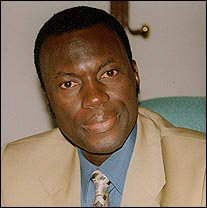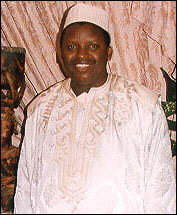 FINANCE: FINANCIAL AND ECONOMIC REFORMS WIN PLAUDITS FINANCE: FINANCIAL AND ECONOMIC REFORMS WIN PLAUDITS |
In 1999 the Guinea's Gross Domestic Product (GDP) was almost 4000 million USD, and had a growth rate of 3.7% compared to that of last year, which was 4.9%. The government is targeting 5% growth rate for the year 2000. The inflation rate superior by 0.6% to the goal set in the Program, and the Budget Deficit went from 5.9% in 1998 to 3.8% in 1999. Exports are around 808 million USD and imports at 772 million USD, creating a trade surplus.

Guinea has been undertaking is vast reform programs in its financial and banking sector. The program for the Facilitation of the Growth and Reduction of Poverty (FGRP) is a structural readjustment program reinforced by the International Monetary Fund and the World Bank. Its main objective is to facilitate the introduction of Guinea's financial sector into a market economy, in accordance with its macro economic performance. The Minister of Finance reminds that " the government is adopting a document that will deal with debt reduction, economic recovery, reorganization of the custom services and the fight against corruption." This is the only way to improve Guinea's economic performance, reduce its national debt and poverty, and woe investors to come to Guinea.
Guinea's current situation has been largely affected by the insecurity along its frontiers. As a member of the ECOMOG, it has spent between 10 to 20 million GF in problem areas such as Sierra Leone.
The Guinean State has not received much monetary aid from abroad, even though its exports have been declining dramatically, especially in bauxite, which constitutes a main source of revenue for the country. Increase in the world rate of crude oil prices, having a direct impact on the Special Tax on Petroleum Products (TSPP) have added to this decline. Domestic revenues have thus gone down between 2 to 3 billion GF. The fact that some of the criteria have not yet been achieved justifies the return of the IMF in September 2000. In this sense, fruit of the Administration Council of the IMF, who still has to approve the renewal of the FARC Program of December 1999, will trigger the support by lending institutions for the years to come and for the validation to agree on a third year of assistance from the IMF. "We are trying to continue on the right track. Those goals that have not yet been achieved will do so in due time in order for Guinea to become internationally competitive in a globalized economy", announced the Prime Minister of Guinea, HE Lamine Sidime when talking about increasing Government revenue and Public Expenditure control.
The putting into place of a sound banking, legislative and judicial system in order to attract foreign investors as well as local and regional ones is an indispensable. The increase of domestic revenues is the key to any durable and sustainable economy. The results obtained by March 31, 2000 are satisfying. Showing the increase in the last trimester which came to 169.6 billion GF, a 46% increase for the entire trimester. This is mainly due to the payment of dividends generated by public companies, such as the group Alcoa which took over a management contract of FRIGUIA on March 1, 2000 and which will be investing a total of 150 million USD during a 25-year period. The global budget revenues, without counting the returns from the mining sector have also surpassed the expectations of 4.16 million GF. This has been possible through the reform of the custom services and the securing of its returns. It was the Minister of Finance who decided to withdraw the revenue collection from the primary banks and transfer it to the Central Bank.
| The company in charge of monitoring these aspects is the private customs inspection agency (SGS). They were supposed to determine structural deficiencies. The decrease in imports has had a negative effect on revenue. This effect has resulted in the suppression of exemptions and the urgent procedures of custom duties. All of this must be done under the supervision of the IMF. The every day budget expenses were inferior to 31.6 billion GF. This supports what Camara stated which is that "too many expenses have a domino effect on the deregulation of the monetary and budgetary parameters". Even with a feeble economic activity, the government has been able to decrease its interior debt by 27 billion GF. "We must engage in expenses non futile expenses in order to decrease our dependence on foreign aid," states Camara.

The banking sector plays a vital role, as it must guarantee investors and the various economic agents that they can come and invest in a stable economic environment. Both its efforts and results have been quite positive. It has decreased the discrepancy between the official exchange rate and that in the parallel market, which was of 2 to 3%. It has also decreased the net foreign assets of the BCRG from 70 million USD to 100 million USD, a recommendation from the IMF. The Central Bank's role is to control and maintain a healthy exchange rate, supply money, supervise the established banks, and to define a sound monetary policy. According to the Governor of the Central Bank, Ibrahima Bah"the stabilization of the banking system in guinea has permitted notable advances for the general economy, and the amount of available liquidity has grown from 5.02% against a forecasted 3.4% increase which was forecasted", informed Ibrahima Bah. One of the most positive elements is without a doubt the stabilization of the Guinean currency, which is currently at a rate of 1USD to 1600GF. The last IMF mission has noted these evolutions and counts on the success of the BCRG in restructuring other needy sections in the coming months, such as the National Social Security (CNSS), fiscal audits of the large State corporations, like the SEEG, PAC, SOGEL and the SOTELGUI. The World Bank also required the establishment of a National Committee for the fight against corruption, the audit of the Central Bank and others. Bah believes that Guinea should be part of the Very Indebted Poor Countries (PPTE); a belief recently confirmed by the IMF. This may mean that Guinea's debt will be reduced by 500 million USD. Finally, other Banks to be taken notice of the Banque Internationale pour le Commerce et l'Industrie de Guinée (BICIGUI), the most important one, the Société Générale des Banques en Guinée (SGBG), l'Union Internationale des Banques en Guinée (UIBG), l'International Commercial Bank (ICB), and the ECOBANK which is a creation of the CEDEAO, and a main player regarding sub region economic integration |

